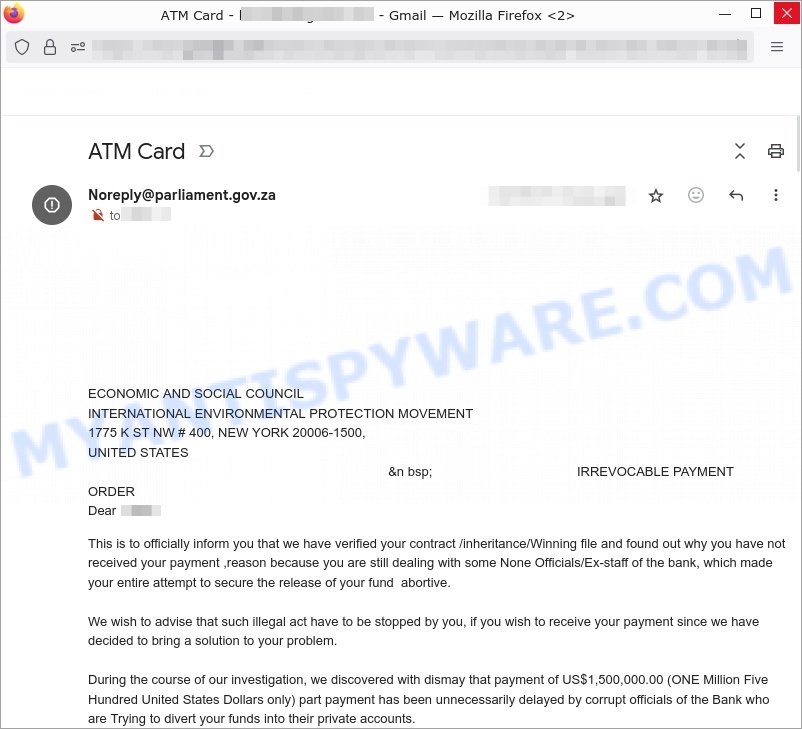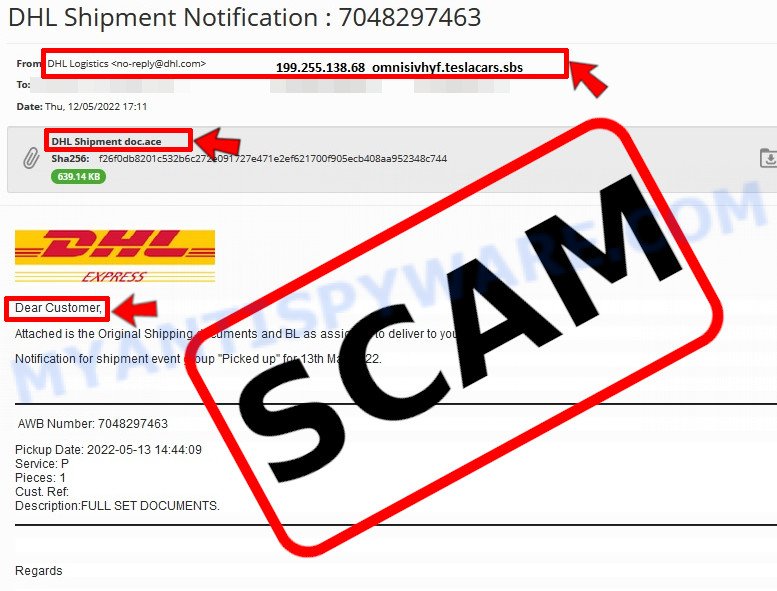⚠️ The Myantispyware team wants to alert you about the IRREVOCABLE PAYMENT ORDER email scam. This scam targets unsuspecting individuals by pretending to be from official-sounding organizations like the ECONOMIC AND SOCIAL COUNCIL or the UNITED NATIONS, and suggesting that they have a large sum of money waiting for them. The email claims that your payment of $1,500,000 has been delayed due to some corrupt bank officials and offers a solution by contacting a fake claims agent.

This scam email is trying to trick you into handing over personal details such as your full name, address, phone number, and identification. By doing this, the scammers aim to steal your identity or scam you further by demanding fees for processing your non-existent payment.
💡 If you receive an email like this, do not respond or provide any personal information. It’s crucial to protect yourself from these scams by deleting the email and not clicking on any links or contacting any phone numbers provided. Make sure to use spam filters in your email settings and report such emails to your email provider. Stay safe by keeping your information to yourself and being cautious of emails that promise large sums of money.
A typical “IRREVOCABLE PAYMENT ORDER” scam email reads as follows:
Subject: ATM Card
ECONOMIC AND SOCIAL COUNCIL
INTERNATIONAL ENVIRONMENTAL PROTECTION MOVEMENT
1775 K ST NW # 400, NEW YORK 20006-1500,
UNITED STATES
&n bsp; IRREVOCABLE PAYMENT ORDER
Dear valeri .This is to officially inform you that we have verified your contract /inheritance/Winning file and found out why you have not received your payment ,reason because you are still dealing with some None Officials/Ex-staff of the bank, which made your entire attempt to secure the release of your fund abortive.
We wish to advise that such illegal act have to be stopped by you, if you wish to receive your payment since we have decided to bring a solution to your problem.
During the course of our investigation, we discovered with dismay that payment of US$1,500,000.00 (ONE Million Five Hundred United States Dollars only) part payment has been unnecessarily delayed by corrupt officials of the Bank who are Trying to divert your funds into their private accounts.
We will monitor this payment ourselves to avoid the hopeless situation created by officials of the bank.
You are therefore advice to contact your claim agent for your MASTER ATM GOLD CARD below;
CONTACT PERSON: MR. MICHAEL MALAKASA
DIRECT PHONE: +27844855074
E-MAIL: malakasa.mic@yandex.com
PAYOUT AMOUNT: US$1,500,000.00- (One Million, Five Hundred Thousand United States Dollars Only)1. Your Full Names:
2. Address:
3. Telephone/ Fax Numbers:
4. Copy of Identification for payment:
5. Country of Origin:Note: Due to imposters, we request you present this reference code to the ATM Card officer ATM/UNSCXX0X5X9X3X25 when contacting him
Please make sure that your reply goes through any of the ATM Director email as stated above. We are sorry for PAIN you must have gone through.
On behalf of UNITED NATIONSYours Sincerely
DR. RHAI SAI
UNITED NATIONS OFFICE
Summary Table
| Name | IRREVOCABLE PAYMENT ORDER Scam |
| Type | Email Scam |
| Contact Name | Mr. Michael Malakasa |
| Contact Email | malakasa.mic@yandex.com |
| Contact Phone | +27844855074 |
| Promised Amount | US$1,500,000.00 |
📧 What to Do When You Receive the “IRREVOCABLE PAYMENT ORDER” Scam Email
We advise everyone who receives this email to follow the simple steps below to protect yourself from potential scams:
- ❌ Do not believe this email.
- 🔒 NEVER share your personal information and login credentials.
- 📎 Do not open unverified email attachments.
- 🚫 If there’s a link in the scam email, do not click it.
- 🔍 Do not enter your login credentials before examining the URL.
- 📣 Report the scam email to the FTC at www.ftc.gov.
If you accidentally click a phishing link or button in the “IRREVOCABLE PAYMENT ORDER” Email, suspect that your computer is infected with malware, or simply want to scan your computer for threats, use one of the free malware removal tools. Additionally, consider taking the following steps:
- 🔑 Change your passwords: Update passwords for your email, banking, and other important accounts.
- 🛡️ Enable two-factor authentication (2FA): Add an extra layer of security to your accounts.
- 📞 Contact your financial institutions: Inform them of any suspicious activity.
- 🔄 Monitor your accounts: Keep an eye on your bank statements and credit reports for any unusual activity.
🔍 How to Spot a Phishing Email
Phishing emails often share common characteristics; they are designed to trick victims into clicking on a phishing link or opening a malicious attachment. By recognizing these signs, you can detect phishing emails and prevent identity theft:

💡 Here Are Some Ways to Recognize a Phishing Email
- ✉️ Inconsistencies in Email Addresses: The most obvious way to spot a scam email is by finding inconsistencies in email addresses and domain names. If the email claims to be from a reputable company, like Amazon or PayPal, but is sent from a public email domain such as “gmail.com”, it’s probably a scam.
- 🔠 Misspelled Domain Names: Look carefully for any subtle misspellings in the domain name, such as “arnazon.com” where the “m” is replaced by “rn,” or “paypa1.com,” where the “l” is replaced by “1.” These are common tricks used by scammers.
- 👋 Generic Greetings: If the email starts with a generic “Dear Customer”, “Dear Sir”, or “Dear Madam”, it may not be from your actual shopping site or bank.
- 🔗 Suspicious Links: If you suspect an email may be a scam, do not click on any links. Instead, hover over the link without clicking to see the actual URL in a small popup. This works for both image links and text links.
- 📎 Unexpected Attachments: Email attachments should always be verified before opening. Scan any attachments for viruses, especially if they have unfamiliar extensions or are commonly associated with malware (e.g., .zip, .exe, .scr).
- ⏰ Sense of Urgency: Creating a false sense of urgency is a common tactic in phishing emails. Be wary of emails that claim you must act immediately by calling, opening an attachment, or clicking a link.
- 📝 Spelling and Grammar Errors: Many phishing emails contain spelling mistakes or grammatical errors. Professional companies usually proofread their communications carefully.
- 🔒 Requests for Sensitive Information: Legitimate organizations typically do not ask for sensitive information (like passwords or Social Security numbers) via email.
✅ Conclusion
We hope this article has helped you understand more about the “IRREVOCABLE PAYMENT ORDER” Scam Email and how to avoid falling victim to scammers. If you have received a phishing email that is similar but not identical to the example above, please post it in the comments section of this article. This helps us warn other users about potential scams and improve our resources to protect you better. Stay safe and vigilant! 🛡️
















